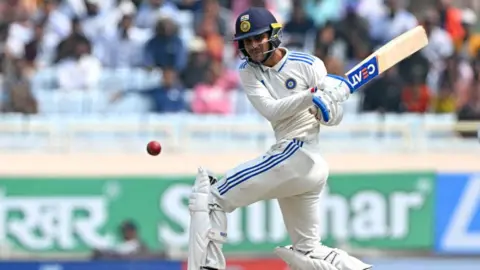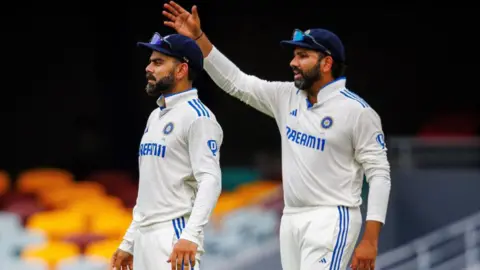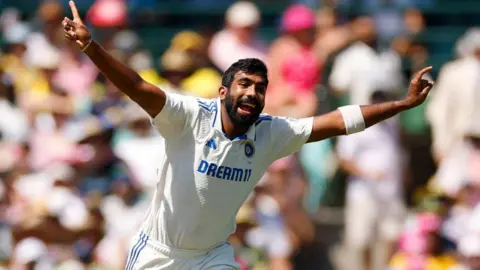
 Getty Images
Getty Images
Gill will be judged on both his performance and his ability to lead a team in transition
A young and untested Indian Test side, led by debutant captain Shubman Gill, begins its toughest examination yet this week: a five-match series in England, starting at Headingley.
It marks the start of the fourth World Test Championship (WTC) cycle and the first contest for the newly renamed Tendulkar-Anderson Trophy, promising both rich drama and formidable challenges.
England have never made a WTC final. India reached the first two but lost - to New Zealand in 2021 and Australia in 2023. A winning start would lift either side's new campaign.
India thrashed England 4-1 in their last meeting, but that was on spin-friendly pitches at home. In England, seaming conditions will test adaptability, technique and mental grit - especially for the batters.
England's Bazball era - led by Ben Stokes and Brendon McCullum - divides opinion, but the results are harder to argue with: since 2022, they haven't lost a home series and have won a majority of their Tests.
In contrast, past records - compounded by recent form, retirements, injuries and fitness concerns - make this a daunting challenge for India.
Since their Test debut at Lord's in 1932, they've toured England 18 times but won only three series - 1971, 1986 and 2007 - while suffering four whitewashes.
The historical imbalance is amplified by recent form: India have lost six of their last eight Tests, missing out on the WTC final and losing stalwarts R Ashwin, Rohit Sharma and Virat Kohli to sudden retirements.

 Getty Images
Getty Images
India has lost Rohit Sharma (right) and Virat Kohli to sudden retirements
Ashwin exited mid-series in Australia last November. Sharma and Kohli announced their retirements just before the England tour squad was picked. To make matters worse, pace spearhead Mohammed Shami was ruled out, with BCCI doctors yet to clear him for red-ball cricket after surgery and rehab.
This leaves India without four high-impact players who shaped a golden era in Test cricket, even if it didn't bring WTC silverware. Sharma's departure also forced a leadership transition.
Enter Shubman Gill. His appointment - over vice-captain Jasprit Bumrah - came after intense internal debate. Bumrah reportedly wasn't confident he could play all five Tests in a packed English summer.
Bumrah's fitness is now the biggest concern. At full tilt, he's arguably the world's best fast bowler, a player who can tilt matches single-handedly. But any interruptions to his bowling - due to workload or injury - could throw India's balance off-kilter.
India's pace bench has depth - Mohammed Siraj, Shardul Thakur, Prasidh Krishna, Arshdeep Singh and Nitish Reddy - but none match Bumrah's aura. In spin, the Jadeja-Kuldeep duo is backed by Washington Sundar's promise.

 Getty Images
Getty Images
Bumrah's fitness is now the biggest concern
Batting is more uncertain.
With Rohit and Kohli gone - they had190 Tests between them - India faces not dents but gaping holes in experience.
Yashasvi Jaiswal has emerged as the brightest batting hope, and KL Rahul remains a capable match-winner.
Prolific run-making in domestic cricket has earned Sai Sudharsan and Abhimanyu Easwaran spots in the squad and and Karun Nair a recall to international cricket.
All of them are tipped to find places in the top order. But for India's batting to show match-winning heft, runs from the bats of Rishabh Pant, and - even more - Gill himself, are paramount.
Captaincy in Test cricket brings not just immense power but also scrutiny. Gill will be judged not only on performance but also how he leads and inspires a transitioning side. Coach Gautam Gambhir, too, is under pressure, following big defeats last season to New Zealand and Australia.
Indian cricket stands at an inflection point. Gill leads a team in flux. The path ahead is steep, but not uncharted.
In 1971, India faced a similar crossroads.
Then chairman of selectors Vijay Merchant, intent on rejuvenating Indian cricket, ushered in sweeping changes - using his casting vote to replace Mansoor Ali Khan Pataudi with Ajit Wadekar as captain for the twin tours of the West Indies and England.
India went on to win the first time ever in both countries, to make it an Indian Summer. Gill now has a chance to script a sequel.








 English (US) ·
English (US) ·